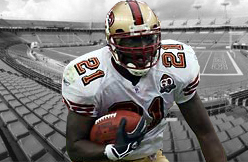Dec/01/10 05:35 PM Filed in:
Frank GoreFrank Gore looks likely to avoid surgery on his fractured right hip, the 49ers said Wednesday, a surprise announcement that suggests the running back will have a smooth recovery.
The 49ers described the injury as a small, non-displaced fracture, meaning it is nothing like the severe hip injury that shortened the career of former Raiders running back Bo Jackson.
"We will wait a few weeks and check it again and see how the progression is and just kind of go from there," coach Mike Singletary said. "But he should be fine."
The no-surgery proclamation surprised several sports medicine experts contacted by the Mercury News.
More than one orthopedist suggested that it indicates Gore didn't suffer a "fractured hip" at all but rather a fracture to the acetabulum -- the socket of the hip joint.
Dr. Thomas Byrd, like the doctors interviewed for this story, stressed that he could talk only in general terms and not about Gore specifically because he had no access to Gore's medical records.
He said that while fractured hips are rare among NFL players, acetabulum fractures are not. As the Tennessee Titans team physician from 1997-99 and from 2003 to present, he said he has seen roughly a dozen such cases.
Byrd said that those players tended to require at least six weeks to heal but could return at full strength without surgery.
The 49ers have declined to address specifics of Gore's injury, saying only that their two-time Pro Bowl running back was scheduled for further examination. Gore sustained the injury against the Arizona Cardinals on Monday night and has been placed on season-ending injured reserve.
Dr. Thomas Barber, an Oakland-based orthopedic surgeon, said that a fractured hip requires surgery 99 percent of the time and suggested that the 49ers might be using the phrase "fractured hip" as a catchall term for another injury.
Barber said it is just too unusual for a fractured hip to be fixed by anything other than an operation.
Like Byrd, he said he could not talk about Gore specifically but ventured that the team could be referring to a fracture the trochanter -- at the top of the femur where the muscles attach.
The "non-displacement" label used by the 49ers could be a good sign for Gore. In the famous case of Jackson, his hip was yanked out of his socket as he was tackled. The displacement disrupted the blood flow during Jackson's recovery, which meant, in Barber's words, "the bone basically dies."
Jackson required a hip replacement and lost his blazing speed.
Because of Gore's heavy workload, there has been speculation that his injury stems from overuse. That is extremely unlikely, according to Victor Khabie, the co-chief at the Orthopedics and Spine Institute at Northern Westchester (N.Y.) Hospital.
Click here to order Frank Gore’s proCane Rookie Card.

(mercurynews.com)



